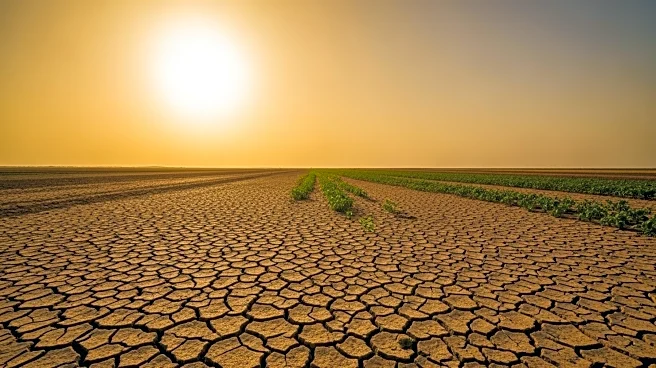What's Happening?
A recent study has highlighted a decline in land productivity within the Great Green Wall (GGW) region, a semi-arid transition zone in the Sahel. The GGW initiative, involving 11 countries such as Ethiopia, Chad, and Niger, aims to combat land degradation and desertification. The study found that despite human efforts to restore the land, productivity has decreased due to factors like temperature, radiation, and rising CO2 levels. The research utilized various datasets to analyze vegetation greenness dynamics from 2015 to 2022, revealing that human contributions to restoration are outweighed by degradation. The study employed advanced methodologies to assess land productivity dynamics, categorizing them into five classes ranging from declining to increasing productivity.
Why It's Important?
The decline in land productivity in the GGW region is significant as it impacts efforts to combat desertification and climate change in the Sahel, a region vulnerable to land degradation. This decline could hinder the achievement of Sustainable Development Goals related to land restoration and climate resilience. The findings underscore the challenges faced by countries involved in the GGW initiative, as they strive to balance restoration efforts with the adverse effects of climate change and human activities. The study's insights into the driving factors of land productivity decline can inform future strategies to enhance restoration efforts and mitigate degradation.
What's Next?
The study suggests that addressing the decline in land productivity will require a multifaceted approach, considering both climate change and human activities. Countries involved in the GGW initiative may need to reassess their strategies and increase collaboration to effectively combat land degradation. Further research could focus on refining restoration techniques and exploring innovative solutions to enhance land productivity. Policymakers and stakeholders might consider integrating these findings into broader environmental and climate policies to ensure sustainable development in the region.
Beyond the Headlines
The study's findings highlight the complex interplay between climate change, human activities, and land productivity. It raises ethical considerations regarding the responsibility of developed nations in supporting restoration efforts in vulnerable regions like the Sahel. Additionally, the research could prompt discussions on the long-term sustainability of initiatives like the GGW, emphasizing the need for adaptive management practices that can respond to changing environmental conditions.










